Publications
Internet law column
January 2025
Written by the Laboratoire Innovation Communication et Marché (LICeM), under the responsibility ofAgnès Robin, Senior Lecturer HDR. From June 2023 to November 2024. With the participation of Arnaud Diméglio, Agnès Robin, Laura Tomasso, Sandrine Roose-Grenier, Alexandre Bories, Malo Depincé and Axel Saint-Martin.
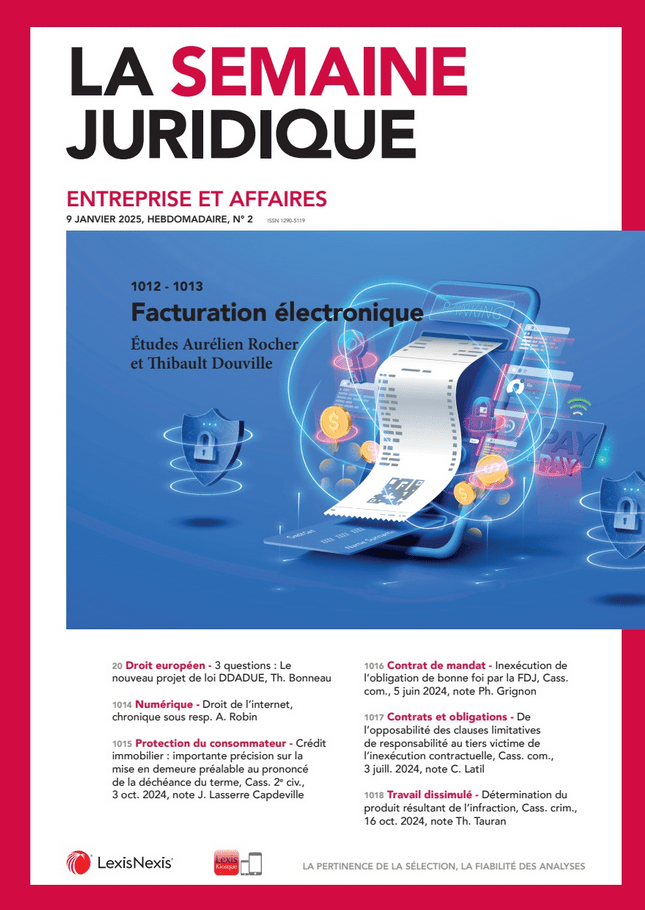
Review to be read in JCP E, January 9, 2025, No. 2
competition law
4th edition
June 2024
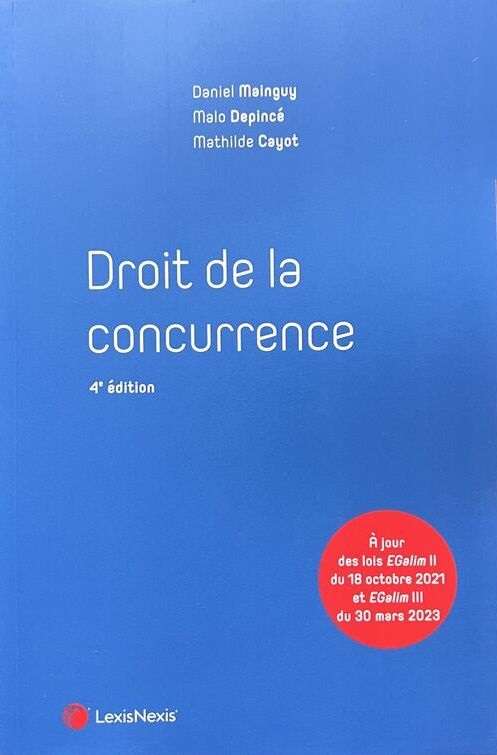
Daniel Mainguy, Malo Depincé, Mathilde Cayot
Publisher's presentation
Unfair competition, parasitism, brutal breach of established commercial relations, cartel, abuse of dominant position, market power, competitive damage, fixed prices, mergers, state aid, European authorities: the key words in competition law are legion. Competition law is not easy to grasp. The aim of this book is to make it accessible to all, by presenting an analysis of both anti-competitive practices (antitrust law) and those that form part of the flow of ordinary business law (unfair competition, non-competition clauses, restrictive competition practices, etc.).
The authors:
Daniel Mainguy is a professor at the Sorbonne Law School, University of Paris 1 Panthéon-Sorbonne.
Malo Depincé is Professor at the Faculty of Law and Political Science, University of Montpellier, and Director of LICeM.
Mathilde Cayot is a lecturer at Université Paul-Valéry Montpellier 3 and a member of LICeM.
Read thededicated article.
stipulation compliance analysis tool (cacs)
March 2024
Under the direction of Malo Depincé, Agnès Robin, Laurent Fauré, Mathieu Lafourcade, Anne Laurent
Project objectives and presentation
Set up an automatic system for checking compliance with general terms and conditions of sale or use available online.
The aim of this interdisciplinary project is to build a computer system capable of both identifying general contractual conditions on websites and analyzing the stipulations they contain, in order to initiate an alert when they do not comply with regulations, case law or institutional opinions. The first phase of this project, financed by the GIP Mission de recherche Droit et Justice which became IERDJ during the course of the project, involved developing a tool for analyzing the conformity of contractual stipulations. The tool was designed for clause-by-clause analysis, although it is not yet possible to effectively assess an entire contractual document.
The project's initiators started from the observation that the information contained in general terms and conditions of sale or use is too often poorly assimilated by the individuals whom the law is intended to protect (essentially consumers), and that control authorities currently lack the means to systematically analyze them. The aim is to move away from a control system based exclusively on a sampling of practices (agents target behaviors within a global set to analyze them) to a systematic analysis focused on potentially dangerous practices, broadening the scope of control. The aim is to develop a computerized tool that will make the legal information contained therein accessible. This tool could analyze the compliance with current regulations of products or services available on the market and whose privacy policy is online. Ultimately, the aim of such a system is to filter all online contractual practices.
Initially, prior to any systematic control of websites and the GTCs or GCSs they contain (by suction robots), the project is building a tool for analyzing the stipulations individually submitted to it.
It aims to meet a twofold challenge: to give as accurate an answer as possible as to the legal conformity of each clause (the "accurate" answer being the one that comes closest to the one that a judge, if the function of judging can be reduced to an abstraction, would have given) and, since the aim is to propose these solutions to specialists (the Direction générale de la concurrence, de la consommation et de la répression des fraudes - DGCCRF - has a similar project) as well as to consumers, to give all the explanatory elements for this solution.
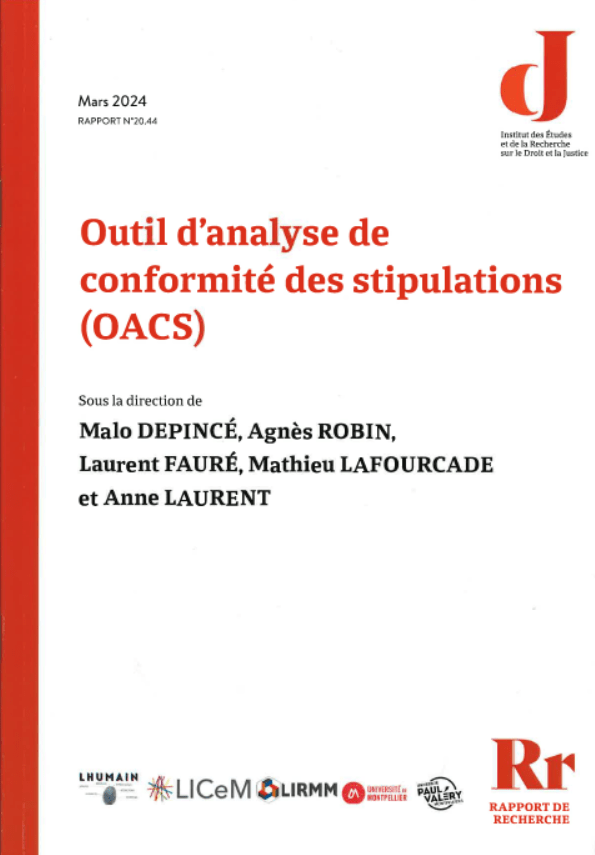
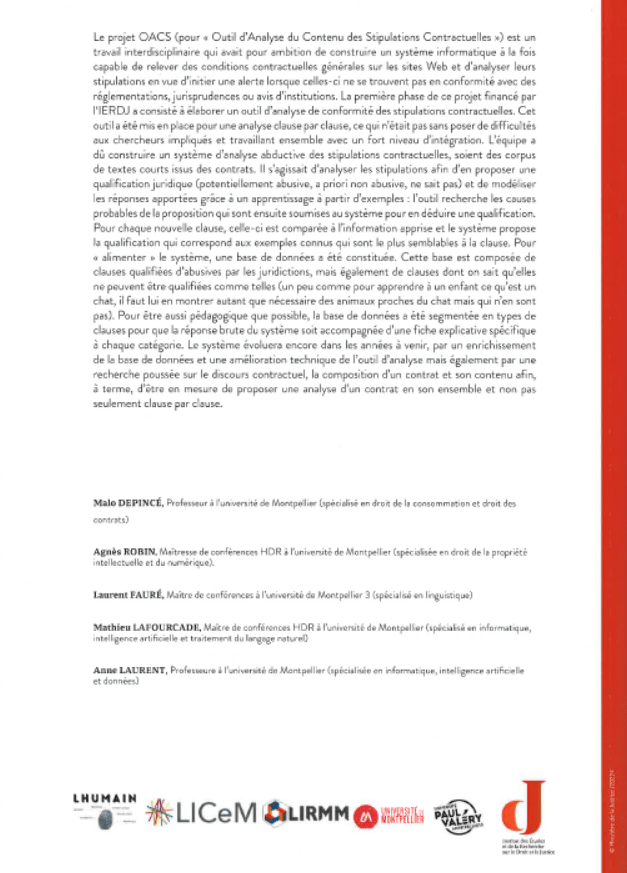
Droit de L'Alimentation: Feed, care, protect, reconcile
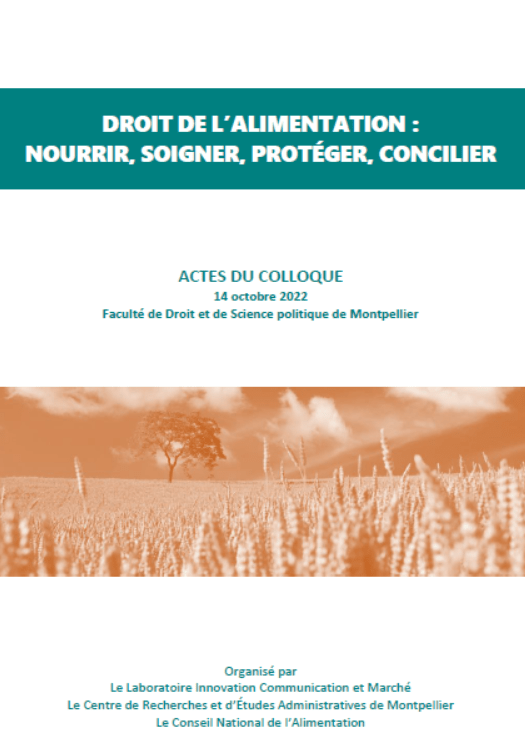
The Faculty of Law and Political Science at the University of Montpellier has created a new national Master's degree in Food and Agroecology Law, which opened for its first year in September 2021. The first class graduated in September 2023.
The aim of this new diploma is to train students in initial training (many of whom are on sandwich courses) and professionals in continuing training in the contemporary challenges of food: without losing sight of the objective of feeding, the agri-food industry has also been assigned the missions of protecting the environment and local or national traditions, caring for populations and preventing environmental risks. By taking into account its effects on the environment and people, the evolution of the law can contribute to better collective living.
To celebrate this pedagogical innovation, which aims to respond to the new challenges of food, the Faculty of Law and Political Science at the University of Montpellier has organized an international symposium on the theme of the new challenges of food, with the support of the MUSE program and the Conseil National de l'Alimentation.
See the article devoted to the symposium proceedings
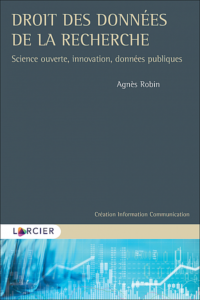 Research data law
Research data law
Open science, innovation, public data
1st edition 2022 - by Agnès Robin
Since the principles of open data have been asserted at both European and national level, in the service of a particularly proactive research and innovation policy, scientific research data have gradually become a genuine legal subject. See the publisher's website
See Joachim Schöpfel's review in Études de communication, 2023/1 (No. 60), on cairn.info
Also available (subscription) on strada lex
Les Cahiers Teutates. Law and economics
They take the form of an electronic magazine, available in PDF format for download from our website. Issues are edited as they are published, and collected twice a year.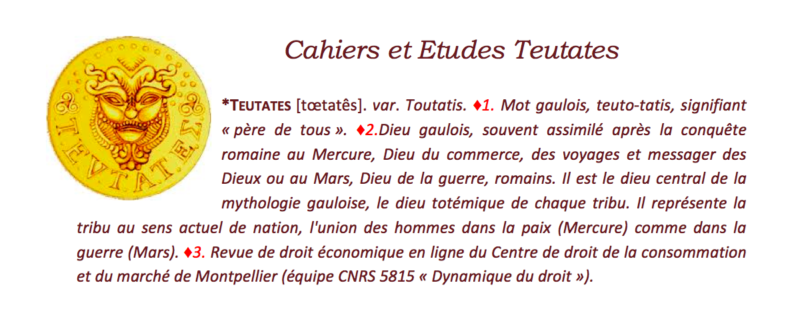
EDITORIAL TEAM
Editor :
- Daniel MainguyProfessor at the Law Faculty of Paris 1 Panthéon-Sorbonne
Editorial secretaries :
- Malo DepincéSenior Lecturer at the Faculty of Law of Montpellier
- Julien RoqueAssociate Professor, University of Montpellier
- Caroline RajaAssociate Professor, University of Montpellier
SCIENTIFIC ADVISORY BOARD
- Daniel MainguyProfessor at Montpellier Law School
- Regis FabreLecturer at the Montpellier Law School, lawyer, managing partner of Baker Mckenzie
- Hughes KenfackProfessor at the Toulouse Law School
- Malo Depincé,SeniorLecturer at Montpellier Law School
2013
2012
Teutate studies
They complement the Cahiers Teutats and include theses, colloquium proceedings, online books and theDossiers Pratiques Teutates (on technical topics).
Céline Alcalde La distribution automobile - Étude juridique, Teutates 2012
Celine-alcalde-la-distribution-automobile-etude-juridique-teutates-2012